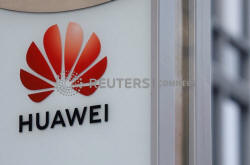U.S. FCC votes to advance proposed ban on Huawei, ZTE gear
 Send a link to a friend
Send a link to a friend
 [June 18, 2021] By
David Shepardson [June 18, 2021] By
David Shepardson
WASHINGTON (Reuters) -The U.S. Federal
Communications Commission voted unanimously on Thursday to advance a
plan to ban approvals for equipment in U.S. telecommunications networks
from Chinese companies deemed national security threats like Huawei and
ZTE.
The vote drew opposition from Beijing.
Under proposed rules that won initial approval, the FCC could also
revoke prior equipment authorizations issued to Chinese companies.
A Huawei spokesperson, in an email, called the FCC revision "misguided
and unnecessarily punitive."
Acting FCC Chairwoman Jessica Rosenworcel said the new measures would
"exclude untrustworthy equipment from our communications networks... We
have left open opportunities for (Huawei and other Chinese equipment)
use in the United States through our equipment authorization process. So
here we propose to close that door."

FCC Commissioner Brendan Carr said the FCC has approved more than 3,000
applications from Huawei since 2018.
The FCC action would prohibit all future authorizations for
communications equipment deemed to pose an unacceptable risk to national
security.
"The United States, without any evidence, still abuses national security
and state power to suppress Chinese companies," said Zhao Lijian, a
spokesperson at China's foreign ministry.
"Once again we urge the U.S. to stop stretching the concept of national
security and stop politicising economic issues," Zhao said at a regular
media briefing in Beijing.
In March, the FCC designated five Chinese companies as posing a threat
to national security under a 2019 law aimed at protecting U.S.
communications networks.
A group of U.S. lawmakers including Democratic Senator Ed Markey and
Republican Senator Marco Rubio praised the FCC action saying it mirrors
the goals of bipartisan legislation. They said the FCC voted "to put
national security first by keeping compromised Chinese equipment out of
U.S. telecommunications networks."
[to top of second column] |

Logo of Huawei is seen in front of the local offices of Huawei in
Warsaw, Poland January 11, 2019. REUTERS/Kacper Pempel/File Photo

The affected companies included the previously designated Huawei and ZTE, as
well as Hytera Communications Corp, Hangzhou Hikvision Digital Technology Co and
Zhejiang Dahua Technology Co.
Huawei said "blocking the purchase of equipment, based on a 'predictive
judgment,' related to country of origin or brand is without merit,
discriminatory and will do nothing to protect the integrity of U.S.
communications networks or supply chains."
In August 2020, the U.S. government barred federal agencies from buying goods or
services from any of the five Chinese companies.
In 2019, the United States placed Huawei, Hikvision and other firms on its
economic blacklist.
Last year, the FCC designated Huawei and ZTE as national security threats to
communications networks - a declaration that barred U.S. firms from tapping an
$8.3 billion government fund to purchase equipment from the companies.
The FCC in December finalized rules requiring carriers with ZTE or Huawei
equipment to "rip and replace" that equipment. It proposed a reimbursement
program for that effort, and U.S. lawmakers in December approved $1.9 billion to
fund it.

Rosenworcel said the FCC will vote in July to finalize the rules overseeing the
reimbursement fund.
(Reporting by David Shepardson; Additional reporting by Cate Cadell in Beijing;
Editing by Chizu Nomiyama, Dan Grebler and David Gregorio)
[© 2021 Thomson Reuters. All rights
reserved.] Copyright 2021 Reuters. All rights reserved. This material may not be published,
broadcast, rewritten or redistributed.
Thompson Reuters is solely responsible for this content. |